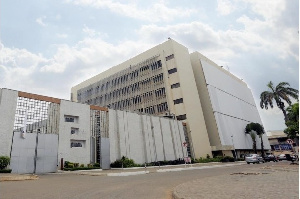- Home - News
- Polls
- Year In Review
- News Archive
- Crime & Punishment
- Politics
- Regional
- Editorial
- Health
- Ghanaians Abroad
- Tabloid
- Africa
- Religion
- Election 2020
- Coronavirus
- Photo Archives
- News Headlines
- Press Release
General News of Saturday, 4 February 2023
Source: classfmonline.com
We’ll present full details of Gold-for-Oil deal – BoG
First Deputy Governor of the Bank of Ghana, Maxwell Opoku Afari, has told Parliament’s Public Accounts Committee that the central bank will make available the full details of the gold-for-oil deal which resulted in the government receiving 41,000 metric tonnes of oil in January.
Answering questions before the committee on Friday, 3 February 2023, Mr Afari said: “What I can confirm is that the gold is being purchased in local currency so it is a conversion of our local assets into foreign assets, and then it is being purchased at the world market price”.
“We use the Bloomberg and Reuters market prices to purchase the gold.”
“I will beg the committee because; I do not have the full details now”, he pleaded, promising: “The details of the transaction would be presented before the committee in due course.”
Meanwhile, COPEC’s Duncan Amoah has said the gold-for-oil programme is “clearly dead on arrival”.
In his view, instead of the programme pushing down the prices of fuel at the pumps, the reverse is happening.
Petrol is currently selling at GS15.4 and diesel GHS15.99 following a 15 per cent increase in prices.
Mr Amoah told Valentina Ofori-Afriyie on Class91.3FM’s midday news 12 Live that the Bank of Ghana should have sustain the gains it made with regard to slowing down the depreciation of the cedi relative to the dollar, which, in his view, impacted fuel prices positively.
“We felt the Bank of Ghana should have worked to sustain the gains made by the cedi”, he said, adding: “Unfortunately, we’ve lost focus and are now banking hopes on a certain opaque programme that we titled gold-for-oil “.
“At the very time that the gold-for-oil programme has commenced, for which last week, BOST did put on the market some 41,000 metric tonnes of oil, the reverse is what is rather happening with Ghanaian pump prices, so, clearly, there was a solution we found in November, December to control the cedi depreciation that sort of worked, and for which we had prices drop in November, December and early January”, he explained.
“Unfortunately, we are now banking hopes on a policy or programme whose benefits we are unlikely to derive and that can be attributed to the fact that what was brought in last week made no impact whatsoever in bringing down prices. To the contrary, the prices at the pumps, as of this morning, have gone up by as much as 15 per cent”, he noted.
Entertainment










